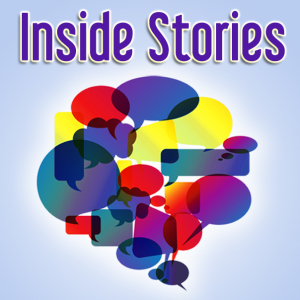 Annie Robinson (52 Posts)
Annie Robinson (52 Posts)Curator of Inside Stories and in-Training Staff Member
Columbia University
Annie Robinson completed a Master of Science in Narrative Medicine at Columbia University in 2014. She previously studied the healing power of stories as an undergraduate at NYU’s Gallatin School of Individualized Study.
Annie works as Narrative Coaching Specialist with Eating Disorder Recovery Specialists, helping individuals in the early stages of eating disorder recovery through mindfulness, meditation, yoga, and narrative practices. She is also the Program Officer at Health Story Collaborative, a non-profit that creates forums for individuals to tell their stories of personal health challenges, and curates another oral narratives projects called On the Road to Recovered: Voices from the Eating Disorder Recovery Community.
Annie is a coordinator and full-spectrum doula for The Doula Project in New York City, providing compassionate care for women during experiences of abortion, miscarriage, and fetal loss.
As a yoga teacher, writer, educator, and co-founder of NYC-based wellness community Pause, Breathe, and Connect, Annie shares her passion for integrative approaches to wellbeing. She is dedicated to creating spaces for people to explore the healing potential of interweaving of stories, spirituality, and somatic experience.
Inside Stories
Inside Stories is an oral narratives project which invites medical students to share their experiences in medical school in the form of brief podcasts published and archived on in-Training. The project aims to provide a means of personal healing, self-realization and empowerment through the sharing and receiving of personal stories, as well as to cultivate community among students in the often isolating medical school environment. The title Inside Stories reflects the project's mission to encourage students to go inside themselves and bring forth things that often go unspoken. It also represents the inside look listeners are granted into the sometimes private, challenging and confusing experiences students may have.
Made possible in part by a grant from the Arnold P. Gold Foundation and FJC.


How can doctors-in-training navigate uncomfortable encounters with physicians of different generations and genders? Sam, a third-year medical student, shares her experience receiving inappropriate advances from an older male doctor, and reflects on the range of responses she could have made.
How can doctors-in-training cultivate a strong community in order to survive the challenges of the first year of medical school? Mckenna, a rising second-year medical student, reflects on the lessons she learned from her first year in medical school: the importance of working with others, taking care of yourself and being humble. She also shares why she feels hopeful for the future of health care.
This week on History & Physical, Kevin Wang interviews Dr. Danielle Ofri. Dr. Ofri is the author of The New York Times best-seller “What Doctors Feel,” editor-in-chief of the Bellevue Literary Review, contributor to The New York Times, associate professor of medicine at New York University School of Medicine, and internist at Bellevue Hospital.
How can doctors-in-training stay open to the many possible paths they can pursue without getting overwhelmed? Rebecca, a rising second-year medical student who took time off between undergrad and medical school, reflects on the challenges and opportunities that committing to medical school entails for her.
How can doctors-in-training practice medicine with a social justice approach that acknowledges health is not just about medicine, but about systems? Teresa, a recent medical school graduate from Hawaii going into family medicine, examines how her own privilege informed her mission to serve the communities she cares for as a clinician.
How can doctors-in-training confront great suffering without closing off emotionally? Jamie, a Class of 2014 medical student graduate heading to work at ABC News and starting a media project about the interface of meditation and medicine, shares how she practices presence with her own body and emotions in order to be present with others.
How can doctors-in-training not let beautiful moments with patients get buried beneath the challenges and monotony often experienced during medical school? Lisa, a fourth-year medical student about to join the University of Chicago NorthShore family medicine residency, recounts her favorite rotation on which she experienced the magic of delivering babies. She also reflects on what it means to not just be a good medical student, but a good physician.
How can doctors-in-training prioritize human connection with their patients, especially during beginning and end-of-life experiences? Ellie, a fourth-year medical student in New York heading to Santa Rosa, California for a family medicine residency, reflects on what she can offer — and gain — from being present with patients during birth and death.
How can doctors-in-training put narrative medicine into practice? Gab, a third-year medical student in Pittsburgh planning to pursue internal medicine and pediatrics, discovered narrative medicine as an undergraduate majoring in English literature. She describes how engagement with medical humanities not only facilitates deeper patient relationships but also provides a vital means of self-care.
How can doctors-in-training put narrative medicine into practice? Gab, a third-year medical student in Pittsburgh planning to pursue internal medicine and pediatrics, discovered narrative medicine as an undergraduate majoring in English literature. She describes how engagement with medical humanities not only facilitates deeper patient relationships but also provides a vital means of self-care.
How can doctors-in-training incorporate lessons from their own health experiences into the care of their patients? Brieze, a fourth-year medical student at Mt. Sinai, shares about the serious health issues she had as a child which led her to explore integrative approaches to healing that she now offers to both her patients and fellow health care providers.
How can doctors-in-training help improve the experience of minority populations in places where there are few providers with whom they can identify? Carlton, a fourth-year at the Medical University of South Carolina interested in anesthesiology, describes his motivation to pursue medicine in the South, where members of his African-American community are relative newcomers to a primarily white health care system. He also discusses the importance of treating patients as he would like himself and his family to be treated.
 Annie Robinson (52 Posts)
Annie Robinson (52 Posts)Curator of Inside Stories and in-Training Staff Member
Columbia University
Annie Robinson completed a Master of Science in Narrative Medicine at Columbia University in 2014. She previously studied the healing power of stories as an undergraduate at NYU’s Gallatin School of Individualized Study.
Annie works as Narrative Coaching Specialist with Eating Disorder Recovery Specialists, helping individuals in the early stages of eating disorder recovery through mindfulness, meditation, yoga, and narrative practices. She is also the Program Officer at Health Story Collaborative, a non-profit that creates forums for individuals to tell their stories of personal health challenges, and curates another oral narratives projects called On the Road to Recovered: Voices from the Eating Disorder Recovery Community.
Annie is a coordinator and full-spectrum doula for The Doula Project in New York City, providing compassionate care for women during experiences of abortion, miscarriage, and fetal loss.
As a yoga teacher, writer, educator, and co-founder of NYC-based wellness community Pause, Breathe, and Connect, Annie shares her passion for integrative approaches to wellbeing. She is dedicated to creating spaces for people to explore the healing potential of interweaving of stories, spirituality, and somatic experience.
Inside Stories
Inside Stories is an oral narratives project which invites medical students to share their experiences in medical school in the form of brief podcasts published and archived on in-Training. The project aims to provide a means of personal healing, self-realization and empowerment through the sharing and receiving of personal stories, as well as to cultivate community among students in the often isolating medical school environment. The title Inside Stories reflects the project's mission to encourage students to go inside themselves and bring forth things that often go unspoken. It also represents the inside look listeners are granted into the sometimes private, challenging and confusing experiences students may have.
Made possible in part by a grant from the Arnold P. Gold Foundation and FJC.






